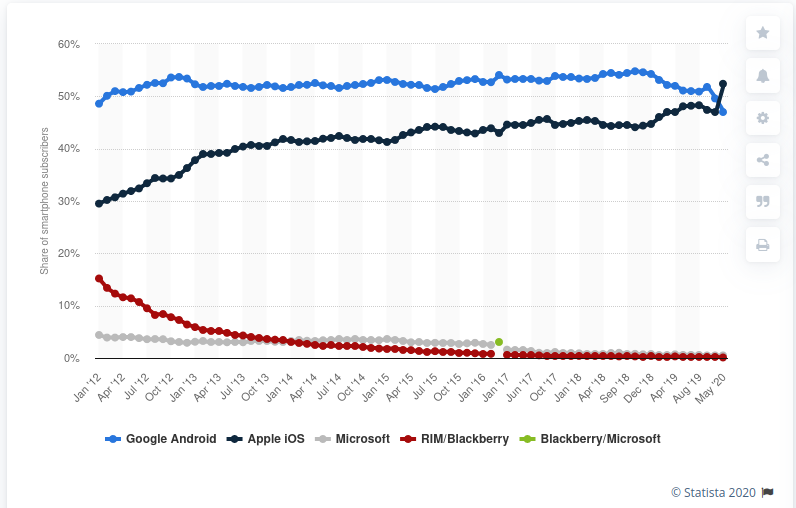Smartphone Innovation Wanted

Rent-Seeking
Smartphones are boring. Try to find a smartphone that isn't Android or iOS. Go ahead, try. Ok, so your searching skills are great and you find Sailfish OS. Try to buy a phone with it. This graph shows a market ripe for disruption.

Android is open source. You may find a bunch of remixes of the open source code, however they're fundamentally still Android. Apple controls iOS and there are no remixes or anything, just the one.
We need alternatives. We need innovation. Smartphones these days are effectively rent-seeking devices. They are very expensive, there isn't much change between new models, and they're dominated by a very few corporations.
Innovators Wanted
Quote from Innovator's Dilemma:
“First, disruptive products are simpler and cheaper; they generally promise lower margins, not greater profits. Second, disruptive technologies typically are first commercialized in emerging or insignificant markets. And third, leading firms’ most profitable customers generally don’t want, and indeed initially can’t use, products based on disruptive technologies.”
― The Innovator's Dilemma: When New Technologies Cause Great Firms to Fail
Many people have made fun of "linux on a phone". Whether it's Ubuntu Touch or PinePhone KDE Edition, the picture created is neckbeards arguing over vim or emacs while unable to make a call on a "phone". I think many people are missing the point of these experiments. One cannot compare mature, profitable ecosystems to innovators trying new things. No one expects to give up their fully functional android/ios phone for one of these experiments, yet. We need more experiments. And we need them faster.
We need people to start thinking about what's possible and trying to build it. e.Foundation is trying to innovate by building a non-Google android ecosystem using existing phone hardware. The Precursor is trying to put the user in control and return trust to the hardware and operating system. We need more of these experiments.
Someone pointed me at Clear. I can't tell what it is, besides a bunch of marketing. Until I see real hardware, it doesn't yet exist for me.
Life with LineageOS
A year ago, I bought a used Pixel 4 off eBay. I never let it boot into the stock OS, rather I wiped it, changed the bootloader, and installed LineageOS. LineageOS is very much "just" the Android Open Source Project (AOSP) without google services installed. This means no Play Store and everything that comes with it. I've solely used F-Droid and the occasional apk when offered directly. The whole point was to test if I could live without either ecosystem (Apple or Google). A secondary point was to see if I was more or less productive in this new world. Obviously, it worked so well I quickly dropped Google. Fundamentally, my phone is still Android and still a part of that ecosystem. It just works and I don't miss 99% of either dominant ecosystem. I'm vastly more productive without all these distractions on the phone. And with no way to easily install distractions (aka apps), the increased productivity is a nice by-product.
I've been down this road before with an Oppo N1 and trying to live without a cell connection. Years later, the combination of my needs changing and the "alternative" tech getting better makes all of this easier and plausible.
Possible Futures
I don't even think the smartphone model is what will disrupt the industry. The current experiments meet Clayton's criteria of cheap, simpler, and break-even costs. However, they're continuing along the model set over the past 13 years of a smartphone. Maybe the past experiments in mobile computing, wearable tech, augmented and/or virtual reality all get mixed into something that works for the average consumer. Maybe in the future, we give up the idea of mobile devices. I think this goes against the trends of computing history. Possibly, someone figures out another model or develops a new modular phone with a new operating system to support it. The Fairphone is a pretty nice phone. And with modular upgrades, it shows a possibility of affordable upgrades as technology advances. Maybe we defer to a "smartglasses" type of device which is somehow connected, wired or wireless, to a hotspot. Or maybe the pandemics get worse in the next 10 years and the thought of mobile anything is crazy.
Today, all I know is that our current two choices are a dilemma. We need real choices in the mobile computing world. Opting out isn't really a choice.